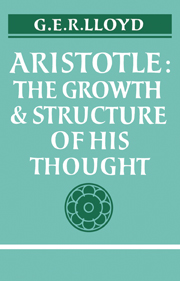Book contents
- Frontmatter
- Contents
- Preface
- Abbreviations
- PART I INTELLECTUAL DEVELOPMENT
- PART II FUNDAMENTALS OF ARISTOTLE'S THOUGHT
- 6 Logic and metaphysics
- 7 The physics of the heavenly region
- 8 The physics of the sublunary region
- 9 Psychology
- 10 Ethics
- 11 Politics
- 12 Literary criticism
- 13 Conclusion
- Suggestions for farther reading
- Glossary of Greek terms
- Index of passages referred to
- General Index
7 - The physics of the heavenly region
Published online by Cambridge University Press: 06 July 2010
- Frontmatter
- Contents
- Preface
- Abbreviations
- PART I INTELLECTUAL DEVELOPMENT
- PART II FUNDAMENTALS OF ARISTOTLE'S THOUGHT
- 6 Logic and metaphysics
- 7 The physics of the heavenly region
- 8 The physics of the sublunary region
- 9 Psychology
- 10 Ethics
- 11 Politics
- 12 Literary criticism
- 13 Conclusion
- Suggestions for farther reading
- Glossary of Greek terms
- Index of passages referred to
- General Index
Summary
The range of ‘physics’
As ϕΎσις is simply the Greek word for nature, ϕΥσική is much wider than our ‘physics’, for it is the science of nature as a whole. Natural objects are those that have a capacity for change or movement within themselves, and ϕΥσική is the science (1) of such natural changes and movements, and (2) of the changing or moving objects themselves. It comprises, on the one hand, the study of things that are in eternal, unchanging movement—the heavenly bodies—and, on the other, the study of things that are subject to change and variation, both living creatures and inanimate objects, the elements and their compounds. The ‘physicist’ investigates, for example, the ultimate constituents of matter, the modes of combination of the elements, and their natural movements. Besides astronomy, ϕΥσική, in Greek, includes not only the sciences we should call dynamics, physics and chemistry, but also all the various branches of biology.
The general principles underlying Aristotle's account of movement and change have already been outlined in ch. 3. Both the doctrine of the four causes, material, formal, efficient and final, and that of potentiality and actuality are introduced in the course of critical reviews of previous ideas on causation, and the latter doctrine, in particular, enables him to circumvent the problem that had perplexed Greek philosophers since Parmenides, of how anything can be said to change or come to be at all.
- Type
- Chapter
- Information
- AristotleThe Growth and Structure of his Thought, pp. 133 - 158Publisher: Cambridge University PressPrint publication year: 1968
- 1
- Cited by

